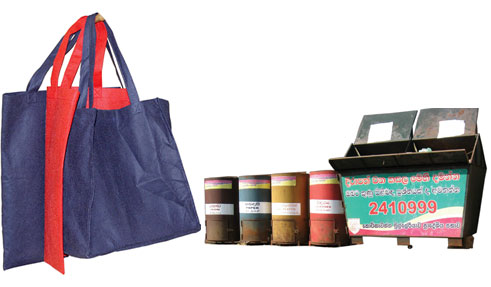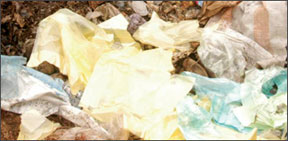War on Waste
By Sajitha Prematunge
[email protected]
There was a great scurry of activity, at my place, as hoards of
accumulated plastic bags, glass bottles and other such junk were sorted
and prepared to be loaded on to a garbage truck of the municipal
council, that was assured to pass our way.
 Money was already being collected for a neighbourhood scale
distribution of compost recycling bins. ‘Garbage’ is a subject much
talked about, at a time when all are conserned about being eco-friendly. Money was already being collected for a neighbourhood scale
distribution of compost recycling bins. ‘Garbage’ is a subject much
talked about, at a time when all are conserned about being eco-friendly.
M. Rizvi Majeed, Project Director of the National Post Consumer
Plastic Waste Management Project, Central Environmental Authority, told
the Sunday Observer that most people are becoming more interested and
inquisitive about garbage segregation.
In an attempt to instill the habit of garbage segregation in the
public, the project has distributed separate garbage bags for different
types of waste such as plastic and glass, via the local authorities in
some areas of the Western Province, since its inception last July. They
are now in the process of implementing the project in the Southern and
Central Province.
A large scale waste segregation awareness programme is now under way.
With the collaboration of welfare societies, the project office plans to
distribute garbage bins to government flats in the jurisdiction of the
Colombo Municipal Council, where the space constraints discourage the
use of segregation bags within the apartments. The waste collected are
then sent to the collectors by the welfare societies.
“This is a win win situation where the welfare societies can earn an
extra income through the revenue obtained from providing the collected
garbage to recycling companies.
Rizvi Majeed says that judging by the monthly reports provided by the
collectors, there is a 36% increase in the waste collected, since last
July. Garbage segregation bags and bins have also been made available at
Adam’s Peak and Nuwara Eliya during the season and the Project Director
claims that they have been faring quite well.
But the best eco-friendly bag is the Pan malla of the old days, some
people of the rural areas still use, but is rapidly disappearing.
Fortunately for the environment a substitute is now in the market - or
shall I say the supermarket - smartly hanging off the hooks in
supermarkets such as Arpico, Cargills and Keels.
G. D. Kadigamuwa, the Assistant Manager of Cargills Food City
Maharagama told the Sunday Observer that he has been using the new
Cargills Eco-friendly bag at his home for over four months. It can
support up to 5 kg max, but the best thing about the bag is probably
that it is washable. G. D. Kadigamuwa claims that during promotions the
number of eco-bag purchases increases.
|

Can we win the battle with garbage? |
The whole purpose of the bag is to minimize the demand for polythene
bags.
But some people are reluctant to use the bag right out of the hooks
and requests for polythene bags because they do not want to spoil the
eco-friendly bags. “But there are regular customers who return, with the
eco-friendly bags, for shopping.”
Although the polythene bags that are currently in use in his
supermarket is biodegradable, G. D. Kadigamuwa says that it’s a long
slow process and even degradable polythene has some sort of effect on
the environment. “And it’s comparatively less sturdy.”
Thomas Dinesh, Marketing Executive of Arpico told the Sunday Observer
that their bags, made of polypropylene, can be used up to four months.
He also said that the demand for normal polythene bags have
comparatively dropped since the introduction of the eco-friendly bag.
Ajith Fernando, Executive, Keells Super, Liberty Plaza says that they
have 44 Keells Super outlets for their eco-friendly bags, that are made
of a cotton-polyester mix.
“We sell over three hundred eco-friendly bags in the Liberty Plaza
Keells Super alone.” Although he said that they have not encountered
many problems concerning the eco-friendly bags, he admitted that some
customers still resort to polythene bags for the sake of ease.
The promised garbage truck and compost recycle bins are yet to arrive
at our doorstep, but in the mean time we can do what is in our power to
be eco-friendly ourselves - reuse and recycle as much as possible as
often as possible.
Pic by Kavindra Perera |
